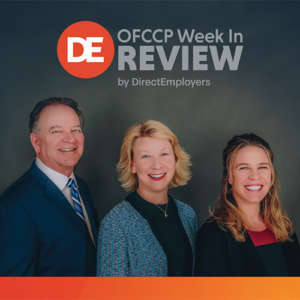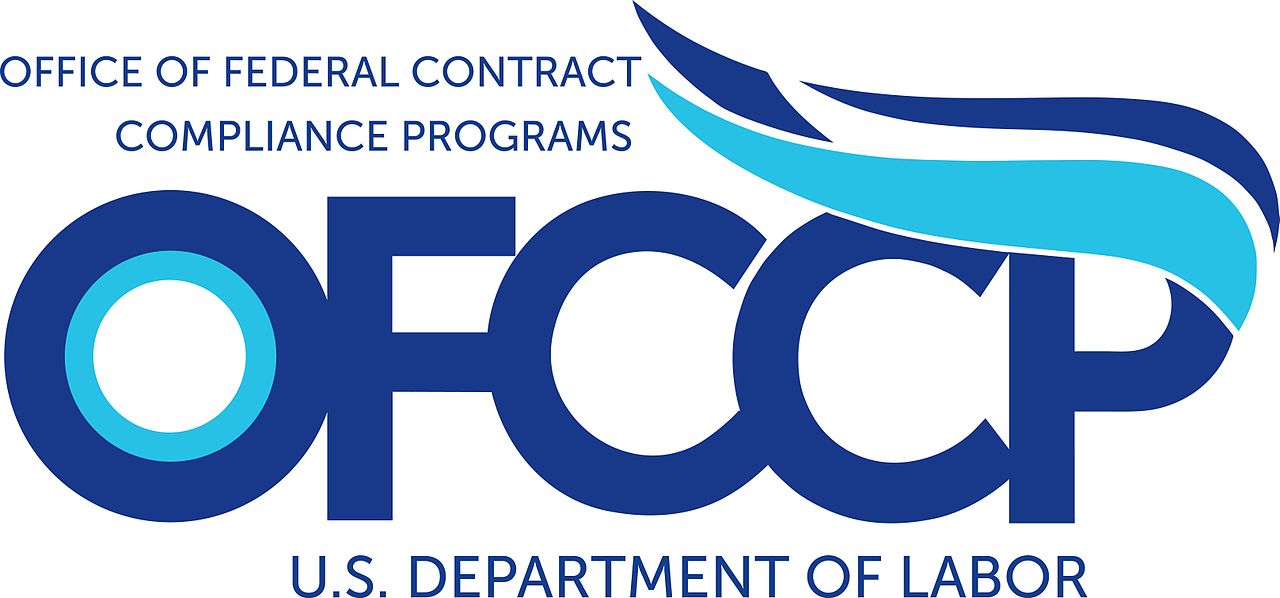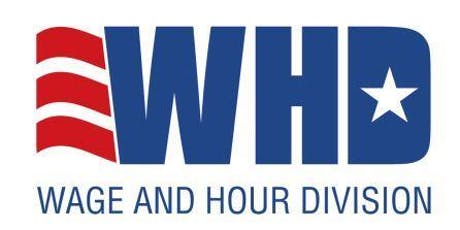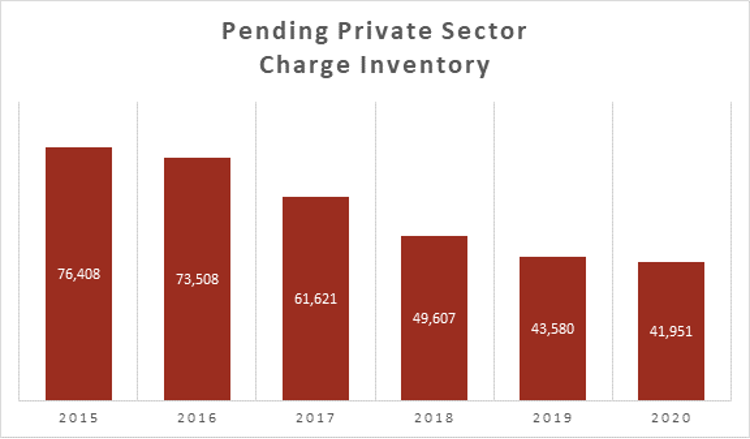 The DE OFCCP Week in Review (WIR) is a simple, fast and direct summary of relevant happenings in the OFCCP regulatory environment, authored by experts John C. Fox, Candee Chambers and Jennifer Polcer. In today’s edition, they discuss:
The DE OFCCP Week in Review (WIR) is a simple, fast and direct summary of relevant happenings in the OFCCP regulatory environment, authored by experts John C. Fox, Candee Chambers and Jennifer Polcer. In today’s edition, they discuss:
- How Ten Organizations Rocked Their Section 503 Compliance Reviews
- Four New WHD Opinion Letters, Including Independent Contractor Scenario
- EEOC Touts $535 Million in Discrimination Recoveries in FY2020
- Day One for President Biden Included, Among Many Actions, Revoking EO 13950
- Several New Appointees (and a Termination) in the Labor World
- Jenny Yang on the Job For Less Than 24 Hours Before Sued to Stop OFCCP’s Religious Discrimination Final Rule
- $15 Federal Min Wage In The Works
Tuesday, January 19, 2021: How Ten Organizations Rocked Their Section 503 Compliance Reviews

To achieve one of these ten Certificates of Merit, an organization must have been one of the 500 companies OFCCP subjected to a Focused Compliance Review for disability AND which met the following criteria:
- achieved the 7% disability utilization goal in 50% or more of its AAP job groups, or for the workforce as a whole if the contractor had 100 or fewer employees; and
- OFCCP found no violations during the focused review
There are ten recipients, including DE Member Quantitech Inc. Congratulations to all of these organizations!
Tuesday, January 19, 2021: Four New WHD Opinion Letters, Including Independent Contractor Scenario

The new Opinion Letters are:
- FLSA2021-6: Addresses whether the FLSA’s “retail or service establishment” exemption applies to staffing firms that recruit, hire, and place employees on assignments with clients. In this example, the Opinion is yes, the exemption would apply.
- FLSA2021-7: Addresses whether certain local small-town and community news source journalists are creative or learned professionals under Section 13(a)(1) of the FLSA. In this example, the Opinion is that these journalists would be exempt “creative” professionals.
- FLSA2021-8: Addresses whether certain distributors of a manufacturer’s food products are employees or independent contractors under the FLSA. In this example, the Opinion is that these would be independent contractors.
- FLSA2021-9: Addresses whether requiring tractor-trailer truck drivers to implement safety measures required by law constitutes control by the motor carrier for purposes of their status as employees or independent contractors under the FLSA, and whether certain owner-operators are correctly classified as independent contractors. In these examples, the Opinion is that the safety measures described in the first scenario do not affect the analysis of the control factor and that the owner-operator truck drivers described in the second scenario are likely independent contractors within the meaning of the term “employee” in the FLSA.
Note: Per the release, “As of January 20, 2021, information in some news releases may be out of date or not reflect current policies.”
Tuesday, January 19, 2021: EEOC Touts $535 Million in Discrimination Recoveries in FY2020
The Equal Employment Opportunity Commission (EEOC) announced its FY2020 Performance Report.
Highlights include:
- the recovery of more than $535 million for victims of discrimination in the workplace ($333.2 million through mediation, conciliation, and other administrative enforcement, $106 million through litigation (highest since 2004), and $2 million for federal employees and applicants);
- conducting more than 2,690 outreach events reaching nearly 300,000 people, including 365 outreach events related to COVID-19, reaching more than 50,000 individuals;
- the completion of more than 6,700 successful mediations resulting in $156.6 million in benefits to charging parties (for more on this, see our recent story on the EEOC Mediation Pilot Program);
- the reduction of the private sector charge workload by 3.7% to 41,951, the lowest pending inventory in 14 years (12.1% decrease in FY 2019 – see our story last year).
Wednesday, January 20, 2021: Day One for President Biden Included, Among Many Actions, Revoking EO 13950

This Order includes direction to the Executive Branch of the federal Government to identify methods to assess the equity of agency policies and actions and to then conduct such assessments within each agency. The Order specifically revoked EO 13950, and directed federal Executive Branch agencies to conduct further assessments of actions the agencies may have put in place to implement EO 13950:
“The heads of agencies covered by Executive Order 13950 shall review and identify proposed and existing agency actions related to or arising from Executive Order 13950. The head of each agency shall, within 60 days of the date of this Order, consider suspending, revising, or rescinding any such actions, including all agency actions to terminate or restrict contracts or grants pursuant to Executive Order 13950, as appropriate and consistent with applicable law.”
Editor’s Note: While it is legally difficult to simply revoke prior Executive Orders by signing a revocation Order, some Member of the public has to file suit to challenge any such withdrawal. It is uncertain whether any individual or company will step up to challenge this particular revocation since EO 13950 was so wildly unpopular. For more on the legal standards to rescind prior Presidential Executive Orders (and also agency Rules), see the DACA BLOG.
This Order instructs that “The head of each agency shall, as soon as practicable and in consultation with the Attorney General, as appropriate, review all existing orders, regulations, guidance documents, policies, programs, or other agency actions (“agency actions”)” and “consider whether to revise, suspend, or rescind such agency actions, or promulgate new agency actions, as necessary to fully implement statutes that prohibit sex discrimination…”
Federal Agency Follow-Up Reports
Within 100 days, each Agency will develop a plan to carry out actions that rectify previous actions inconsistent with this Order.
Preserving and Fortifying Deferred Action for Childhood Arrivals (DACA)
As predicted by John Fox, see his DACA blog from June 2020 for additional DACA information and the “Dreamers.”
Executive Order on Protecting the Federal Workforce and Requiring Mask-Wearing
Although most likely already in place by companies and institutions, this Order mandates that: “The heads of executive departments and agencies shall immediately take action, as appropriate and consistent with applicable law, to require compliance with CDC guidelines with respect to wearing masks, maintaining physical distance, and other public health measures by: on-duty or on-site Federal employees; on-site Federal contractors; and all persons in Federal buildings or on Federal lands.” (emphasis added)
So, if your company or institution places service personnel on a federal property, your employees and independent contractors will have to wear masks, and the type of masks, that agency prescribes.
Regulatory “Freeze” Pending Review
In a Memo to the Heads of Executive Departments and Agencies, Ronald A. Klain, Assistant to the President and Chief of Staff, on behalf of the President, directed the following actions:
- “Propose or issue no rule in any manner” (except in an emergency situation) “until a department or agency head appointed or designated by the President after noon on January 20, 2021, reviews and approves the rule.”
- For rules that have been sent to the OFR (Office of the Federal Register) but not published in the Federal Register, immediately withdraw them from the OFR for review and approval.
- For rules that have been published or issued, but have not taken effect, consider postponing the rules’ effective dates for 60 days, to review any questions of fact, law, and policy the rules may raise.
In the closing paragraph:
“Should actions be identified that were undertaken before noon on January 20, 2021, to frustrate the purpose underlying this memorandum, I may modify or extend this memorandum, pursuant to the direction of the President, to request that agency heads consider taking steps to address those actions.”
Note: These “Day 1 Midnight Regs Freeze Memos” have become commonplace in recent Presidential Administrations. The Klain Memo is a close copy of the “Freeze Memo” then Trump White House Chief of Staff Reince Priebus issued on January 20, 2017 (see details on the follow-up guidance on January 24, 2017).
What’s At Stake?
As we look back 60 days, there are a handful of Final Rules that could be affected.
From DOL/OFCCP:
- Final Rule on “Nondiscrimination Obligations of Federal Contractors and Subcontractors: Procedures to Resolve Potential Employment Discrimination.” (WIR 11/10/20)
- Final Rule on Religious Discrimination (WIR 12/7/20)
- Final Rule on Independent Contractors (WIR 1/7/21)
From EEOC:
- Final Rule on Conciliation Process (WIR 1/14/21)
- Final Rule on Issuing guidance (WIR 11/02/20)
In addition to these Final Rules, there have been various Technical Assistance Guides, Opinion Letters, Directives, MOUs, and several items open (or recently closed) for comments. For example, the verdict is still out on Scabby the Rat!
Wednesday, January 20, 2021: Several New Appointees (and a Termination) in the Labor World

OFCCP
Jenny Yang, the former Obama Administration EEOC Chair, is the new political appointee the USDOL Transition Committee identified to be the Director of the Office of Federal Contract Compliance Programs (OFCCP) as we reported last Monday in a Blog which made the rounds. Following announcement of her new position via the above mentioned Wednesday mid-day USDOL website announcement, Ms. Yang expressed her excitement to join the Biden-Harris Administration via a tweet. she sent on Wednesday night.
It is really too bad that the pandemic is stopping all the fun, pomp and circumstance which normally surrounds such significant announcements and the formal swearings-in which follow with hands on bibles, American Flags in the background and families, children and VIPS in attendance. John Fox remembers flying into Washington D.C. for Cari Dominguez’ swearing in as Chair of the EEOC for a ceremony which had to move to an auditorium in downtown Washington D.C. capable of seating over 500 attendees and dignitaries to watch Cari be sworn in as the EEOC Chair. And now we have announcements via website and acknowledging tweets. Oh well: new times, new circumstances, new ways! Go away already pandemic.
EEOC
The U.S. Equal Employment Opportunity Commission (EEOC) announced that President Biden named Commissioner Charlotte A. Burrows Chair of the EEOC and Commissioner Jocelyn Samuels Vice-Chair of the EEOC.) Section 705 of Title VII (42 USC Section 2000e-4 gives those rights of appointment to The President: “The President shall designate one member to serve as Chairman of the Commission, and one member to serve as Vice Chairman.”
Burrows has served as an EEOC Commissioner since 2015, having been initially nominated by President Barack Obama. In 2019 she was re-nominated and unanimously confirmed for a second term ending in 2023.
These title changes of the two existing Democrat Commissioners on the (five-member bi-partisan “Commission”) does not change the balance of power currently held by the three Republican Commissioners. The 3-2 Republican advantage on the Commission remains. However, Title VII of the 1964 Civil Rights Act (see again Section 705) does assign additional powers to the EEOC Chair–not available to mere Commissioners of the EEOC–“for the administrative operations of the Commission.”
NLRB
President Biden named Board Member Lauren McFerran Chairman of the National Labor Relations Board (NLRB). McFerran served as a Member of the NLRB from December 17, 2014, until December 16, 2019. On July 29, 2020, the Senate confirmed her renomination as a Board Member for a term expiring on December 16, 2024. McFerran is the sole Democrat currently serving on the bi-partisan NLRB Board. One Board Member seat is currently vacant and by law must be accorded to a Democrat of the President’s choosing.
In more surprising news, moments after President Biden’s swearing in, senior Biden White House personnel asked for NLRB General Counsel Peter Robb’s resignation. Robb refused to resign. President Biden then took the extraordinary step to subsequently fire Mr. Robb at the end of the day on Wednesday, the President’s first half-day in office. Alice Stock, who Mr. Robb had appointed in August 2019 to be his Deputy General Counsel, then stepped in as Acting General Counsel and was also forced out at the end of the following day (Thursday the 21st).
While not without prior historical precedent, it is unclear whether President Biden had the legal authority to fire Mr. Robb since the NLRB, like the EEOC, is a bi-partisan agency not subject to the President’s plenary control. The appointment of the NLRB General Counsel, while nominated to serve by the President, is subject to the “advice and consent” of the Senate and serves a four-year term with extensive powers independent of the NLRB Board Members. The NLRB General Counsel’s powers and the GCs term of office are also specified in Section 3(d) of the National Labor Relations Act (NLRA) (see 29 USC Section 153(d)). The Senate confirmed Mr. Robb’s appointment to be the NLRB General Counsel and he was sworn in on November 17, 2017 for a term of four years, ending this November 16, 2021.
Mr. Robb, a hard knuckles litigator, is likely to file suit one can only assume. Moreover, this is a high-risk legal gamble for President Biden since employers adversely affected by decisions Mr. Robb’s and Ms. Stock’s successor(s) makes between now and November 16, 2021 could be challenged in the courts and could potentially be set aside as unlawful because employers could argue, they were carried out by a person(s) who were not authorized to do so. And, similarly, employers are likely to also challenge in the Courts as void ab initio (void from inception) and as also lacking legal authority any roll-backs of any NLRB policies and practices within the scope of the broad authority the NLRA reserves to the NLRB’s Office of General Counsel AND not to the liking of the employer community. Boy, and it is only week one of the Biden Administration! Fireworks exploding in the night skies already.
Thursday, January 21, 2021: Jenny Yang on the Job For Less Than 24 Hours Before Sued to Stop OFCCP’s Religious Discrimination Final Rule
The first of two Complaints was filed in the U.S. District Court for the District of Oregon (Portland Division) by community groups supporting female workers, LGBTQ rights, and a union. The case is Oregon Tradeswomen, Inc. Pride at Work and the American Federation of Teachers, Inc. v. U.S. Department of Labor, Al Stewart in his official capacity as the head of USDOL, OFCCP, and Jenny Yang in her official capacity as the Director of OFCCP. Case No. 3:21-cv-00089.
This 35-page Complaint asks the Court to “vacate” and seeks a declaration that OFCCP’s Final Rule “Implementing Legal Requirements Regarding the Equal Opportunity Clause’s Religious Exemption” (the “Religious Exemption Rule) violates the Administrative Procedure Act because it is not in accordance with law. OFCCP published this controversial Rule in Final at 85 Fed. Reg. 79,324 (Dec. 9, 2020).
Paragraph 6 of the Complaint describes the gravamen of the Plaintiffs’ legal concerns:
“6. The Religious Exemption Rule vastly expands the reach of that limited exemption and expressly authorizes federal contractors and subcontractors to make employment decisions that discriminate on the basis of sex, sexual orientation, or gender identity, among others, by simply citing to the employer’s religious beliefs or views. (see para 6 at page 5 of the Complaint).
The second of the two Complaints was filed in the U.S. District Court for the Southern District of New York by 13 states and the District of Columbia, led by the State of New York. Case No. 21 Civ. 536
This 52-page Complaint asks the Court to “vacate” and enjoin OFCCP’s Final Religious Exemption Rule because Plaintiffs claim it not only violates the Administrative Procedure Act (because it is not in accordance with law), but also because they claim OFCCP exceeded its delegated authority when publishing the Final Rule. In what was one of the best first paragraphs we have seen in years in a Complaint, Plaintiffs in this case explained the entirety of their case in one sentence:
“This lawsuit challenges a Trump Administration regulation that produces a sea change in labor law by unlawfully expanding the religious exemption for federal contractors under Executive Order 11,246, weakening anti-discrimination protections for workers, and prompting an increase in employment discrimination and its attendant effects. Implementing Legal Requirements Regarding the Equal Opportunity Clause’s Religious Exemption, 85 Fed. Reg. 79,324 (Dec. 9, 2020) (to be codified at 41 C.F.R. §§ 60–1.3, 1.5) (the “Final Rule”).”
Because these Complaints raise claims impacting significant First Amendment Religious Freedom rights, and because one never knows whether the U.S. Department of Justice will defend the federal agencies with vigor in cases in which the Administration’s sympathies lie with the suing Plaintiffs, you may soon see religious organizations either seek to join the litigation as parties or to obtain permission to have their views heard as Amicus Curiae (a friend of the court).
In the meantime, OFCCP continues to enforce its Final Rule, although President Biden has already called for its review as one among many Final Rules the Trump Administration published within 60 days of President Biden’s inauguration. (See our companion story on Biden Day One with regard to the Regulatory “Freeze” Pending Review.)
Friday, January 22, 2021: $15 Federal Min Wage In The Works

“The federal government should only award contracts to employers who give their workers the pay and benefits they have earned; President Biden is today directing his administration to start the work that would allow him to issue an Executive Order within the first 100 days that requires federal contractors to pay a $15 minimum wage and provide emergency paid leave to workers.”
This $15.00 minimum wage for federal contractors mirrors the direction given in the Executive Order on Protecting the Federal Workforce. This Order states, among revoking many previous EO’s,
“Section 5. Progress Toward a Living Wage for Federal Employees.
The Director of OPM shall provide a report to the President with recommendations to promote a $15/hour minimum wage for Federal employees.”
Stay tuned as we await another Executive Order (EO) directed at Federal Contractors!
THIS COLUMN IS MEANT TO ASSIST IN A GENERAL UNDERSTANDING OF THE CURRENT LAW AND PRACTICE RELATING TO OFCCP. IT IS NOT TO BE REGARDED AS LEGAL ADVICE. COMPANIES OR INDIVIDUALS WITH PARTICULAR QUESTIONS SHOULD SEEK ADVICE OF COUNSEL.
SUBSCRIBE.
Compliance Alerts
Compliance Tips
Week In Review (WIR)
Subscribe to receive alerts, news and updates on all things related to OFCCP compliance as it applies to federal contractors.
OFCCP Compliance Text Alerts
Get OFCCP compliance alerts on your cell phone. Text the word compliance to 55678 and confirm your subscription. Provider message and data rates may apply.

